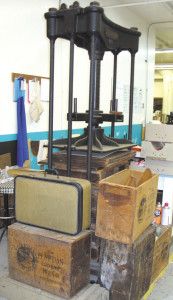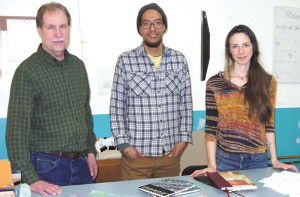In the Enterprise Center on the near east side, employees weave around a maze of tables and mysterious machines, gluing, stitching, applying covers, and trimming books. In one corner, well-loved books are piled — a family Bible, a beloved child’s book, a military book from the 1950s — waiting for the gentle touch of the restorer’s hand. At the National Library Bindery Company of Indiana, it’s all a part of carrying on the tradition of quality that has kept the business alive and humming since 1873.
Owner Joseph Cox knows that in an increasingly digitized world, books could be an endangered species. The bindery used to be the go-to place for universities and companies to preserve information. “We used to bind a lot of chemical, medical, and law journals. That’s all gone to digital,” he said. “I can understand that, with the rate of change in those fields.” The city’s daily paper used to bring all their issues in to be bound as well — they stopped last year, preferring to archive the news digitally. “It is a huge loss. I worry that, in the future, there will be a dark spot in our historical knowledge. Digital formats change, things get lost. Books and paper are constants.”

Photo by Ethel Winslow/Weekly View
An early 1900s book press at the National Library Bindery Company, which is still used.
The traditional business of the National Library Binder Company continues to be fairly strong, however, though the emphasis has shifted. The company still handles binding small and moderate print runs of hardcover books, plus archival bindings of newspapers, legal documents and other business-related materials. They also have a thriving business in self-publishing, binding volumes of poetry, family histories, and even family cookbooks. “We have people who send us their dissertations and theses from all over the world to be bound here,” Cox explained. “We’ve had them from Oxford University, South Africa, everywhere you can think of.”
The binding process is a complex art, requiring precision and coordination. To bind a book, there are anywhere from 25-43 steps — depending on the kind of book, cover, and type of binding. “Mass bookmakers use perfect binding and flat spines, which are great for pushing thousands of books out on huge machines. But the bindings don’t last and the books fall apart fairly easily.”
With the loss of archival binding work, National Library Bindery had to find new markets that would appeal to more than just academics or the business world. “We’ve had to think outside the box,” he said, gesturing to a new line of specialty logbooks. The brainchild of employees Chelsea van der Meer and graphic artist Eric Stine, the pocket-compatible logbooks provide a place for beer, wine, or cheese connoisseurs, birdwatchers, beekeepers, home brewers, mushroom hunters, and genealogists recording graves to jot down vital information. Stine and van der Meer collaborate with experts in the subjects to create the books, designing them to be easily used and stashed for future reference. van der Meer is excited about the future of the logbooks. “These books fill a void that we saw, and there’s no end to subjects we can do,” she said. The books are already selling well in limited release. A wider launch of the books is expected later this spring, and at the Handicraft Exchange in June.
The company created a brand within the company, Yonder-Bound, that creates the logbooks and also offers workshops in bookmaking and restoration. They have been offering classes over the past year at Homespun on Mass Ave. and in other locations throughout the city to people enthusiastic about the handcrafted movement. “We have people taking multiple classes,” van der Meer noted. The next class will be offered on March 28 from from 2-4 p.m. at the Allisonville Nursery (11405 Allisonville Rd.), where participants will learn how to make flower seed packet books. The class is only $35, which includes all materials. (To register, visit www.yonder-bound.com)
Cox is pleased that a new generation is finding value in handcrafted things, particularly books. “I think it’s coming back around,” he said. “You spend eight, ten hours in front of a computer screen, the last thing you want to do is look at another screen. Books just feel right.”



